Selected Projects
 Online Learning for K-12, 2004-
Online Learning for K-12, 2004-
Beginning in 2004, ILT has evaluated the International Baccalaureate Organization’s online learning initiatives, first offered through Virtual High School and then through Pamoja Education. We have looked at teacher and student satisfaction, student learning, and teacher professional development initiatives as the IBO’s offerings have grown from one subject to twelve subjects and from a handful of students to more than 5,000 and from fully online asynchronous courses to blended learning programs.
 NYC ASCENT: Advancing Computer Science Careers through Enhanced Networking and Training, 2014-2018
NYC ASCENT: Advancing Computer Science Careers through Enhanced Networking and Training, 2014-2018
Funded by the National Science Foundation and the Computing Community Consortium, Columbia University, Cornell University, the City University of New York, and New York University have formed a consortium to provide professional development and increased networking opportunities to postdoctoral researchers in computer science and related disciplines. The research is looking at the program’s overall effectiveness as well as contributing to a body of best practices for training postdoctoral researchers.
Integrative Graduate Education and Research Training (IGERT) Fellowships, 2010-2018
NSF-funded IGERT initiatives provide fellowships to graduate students who want to bridge traditional divides between academic departments and engage in interdisciplinary research. ILT has evaluated five-year IGERT grants to Columbia University’s Department of Applied Mathematics and Lamont Doherty Earth Observatory; to the Graduate School of Architecture, Planning, and Preservation and the School of Engineering and Applied Sciences; to the Department of Computer Science and the School of Journalism; Graduate School of Architecture, Planning, and Preservation and the School of Engineering and Applied Sciences; to the School of International and Public Affairs; and to cross-departmental initiatives within the Fu School of Engineering. The evaluations look at the impact on students and faculty, including changes in collaborations across departments and disciplines.
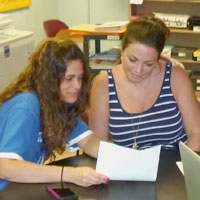 NJ PRIME: NJ Partnership for Research to Improve Mathematics Education (2013–2016)
NJ PRIME: NJ Partnership for Research to Improve Mathematics Education (2013–2016)
NJ PRIME was NJ Department of Education-sponsored Mathematics and Science Partnership grant to the Center for Innovation in Science and Engineering Education at Stevens Institute of Technology to provide school-based teams of K-5 elementary teachers in 12 schools from across northern New Jersey with professional development that would strengthen their content and teaching expertise and prepare them to be effective mathematics teacher leaders. Project research investigated teachers’ understanding of and confidence in key mathematical topics, their pedagogical content knowledge, and their ability to apply the Common Core State Standards in Mathematics to their classroom teaching practices.
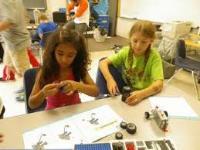 WaterBotics: Build IT! Scale-Up for STEM Learning and Workforce Development Project (2010–2015)
WaterBotics: Build IT! Scale-Up for STEM Learning and Workforce Development Project (2010–2015)
WaterBotics was a scale-up of Build IT, supported by a $2.5 million National Science Foundation ITEST grant to the Center for Innovation in Science and Engineering Education at Stevens Institute of Technology and the National Girls Collaborative Project, with a focus on girls and underserved minorities through formal and after-school education programs. Project research investigated the impact on students, training and classroom implementation, and scale-up and sustainability efforts. Partnering hub sites included Sinclair Community College, Triton College, the Texas Girls Collaborative Project, the Pacific Northwest Girls Collaborative Project, and the Kentucky Girls STEM Collaborative Project. Research and evaluation partners include Teachers College at Columbia University and Evaluation & Research Associates.
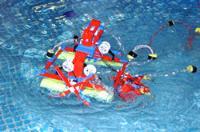 Build IT! (2007-2010)
Build IT! (2007-2010)
The goal of this three-year NSF-funded Information Technology for Students and Teachers (ITEST) project to the Center for Innovation in Science and Engineering Education at Stevens Institute of Technology was to catalyze student interest and achievement in engineering, science, and information technology through the design and construction of underwater robots.
The participants included over 75 teachers from 36 middle and high schools from geographically, socioeconomically and academically diverse schools throughout New Jersey and New York City . The evaluation looked at impact on teachers, students, and guidance counselors.
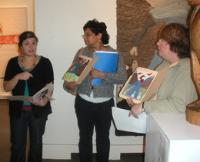 Camden County Arts in Education Model Development and Dissemination (AEMDD), 2006 – 2009
Camden County Arts in Education Model Development and Dissemination (AEMDD), 2006 – 2009
This three-year Department of Education grant to Camden County Technical Schools brings together K-4 teachers with the Rutgers Center for the Arts (RCCA) to infuse arts throughout the curriculum.
The teacher professional development component focuses not only on integrating the arts but on improving curriculum design. The evaluation is looking at the impact of the arts on teacher instructional strategies, student learning, and student engagement.
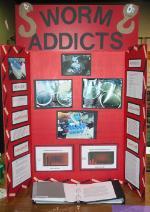 SPARC (Science Preparation Alliance of Rutgers and Camden), 2003 – 2008
SPARC (Science Preparation Alliance of Rutgers and Camden), 2003 – 2008
The goal of this five-year grant from the National Institutes of Health to Rutgers University/Camden is to encourage middle-school students to participate in inquiry-based activities in science by training teachers to help their students create challenging science fair projects, with a particular focus on addiction and drug abuse. The evaluation is looking at the impact on the participating teachers, both in terms of science fair participation and changes in classroom activities, as well as at changes in student participation rates in the science fairs.
Broadening Participation in Computing (BPC), 2005 – 2008
The first goal of this three-year NSF grant to Brooklyn College faculty in Computer Science is to redesign the introductory computer science curriculum in order to attract more women and other groups historically underrepresented in computer science. The second goal is to interest high school students in computer science through two-week summer institutes include mini-courses on games, robotics, cryptography, and web design. The evaluation is looking at the impact of the courses and institutes on the students.
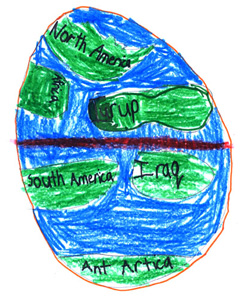 Mapping the World
Mapping the World
This research grant, from the National Geographic Education Fund, continues prior NGEF support for research on children’s geography learning. Begun as a project to use freehand mapping to understand children’s understanding of key geography concepts, the project is now developing GeoGames, an online game to help students understand maps, globes, and mapping.
Online Teaching and Classroom Change
This research grant from NCREL, one of a suite of ten awards to study K-12 distance learning awarded in 2005, looked at the transformations, of teacher and course, and the two-way flow of teaching practices between face-to-face and online environments, with a particular focus on the effect of teaching online on subsequent classroom practice. Results have been presented at AERA, NACOL, and to the Sloan Consortium and will be published in Innovate in Spring 2008.
 Community College Pathways to Improved Teacher Preparation Through Technology
Community College Pathways to Improved Teacher Preparation Through Technology
Although the nation’s community colleges train a high percentage of public school teachers, many community college faculty are unprepared to use technology in their classrooms. By the end of this three-year project (2003-2007), a U.S. Department of Education PT-3 grant to the Center for Innovation in Engineering and Science Education at Stevens Institute of Technology, faculty from thirty community colleges had participated in a hybrid face-to-face and online training and development program to integrate Internet-based curricula into math, science, language arts, and educational technology courses taken by pre-service teachers.
The evaluation looked at the impact on the participating faculty. A summary of the results, entitled Use of Real-World Data and Information in the Classroom: Evolution of a K-14 Teacher Preparation Model, was published by The League for Innovation in the Community College in October 2007.
Adjunct Academy at CityTech
CityTech students are among the less academically prepared of the students in the CUNY system and often fail to get through the required first-year “gatekeeper?courses, leading to high course withdrawal and failure rates, and high program drop-out rates. This three-year (2004-2007) U.S. Department of Education FIPSE grant was to develop an adjunct faculty tutoring program in order to reduce rates of student failure and also create a community among adjuncts. The evaluation looked at the impact of the tutoring program on participating faculty and students.
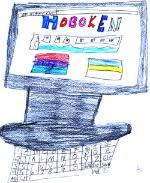 Students Using Technology To Achieve Reading-Writing (STAR-W)
Students Using Technology To Achieve Reading-Writing (STAR-W)
This three-year (2003-2006) grant to the Center for Innovation in Engineering and Science Education at Stevens Institute for Technology from the New Jersey Department of Education sought to increase student achievement in Language Arts Literacy in grades three through five in Hoboken, one of New Jersey’s most struggling cities, through the use of technology. The evaluation looked at the impact on teachers and students.